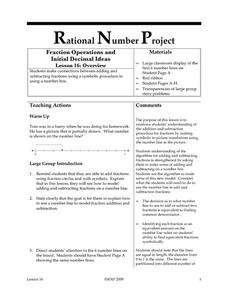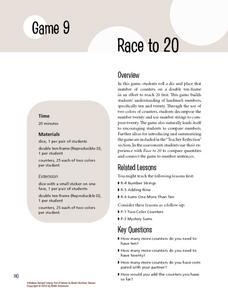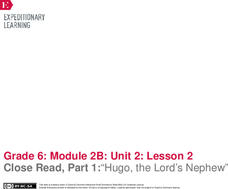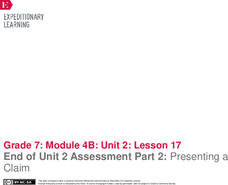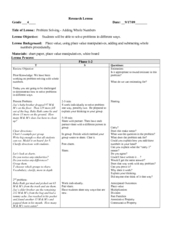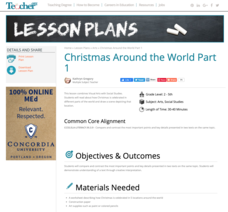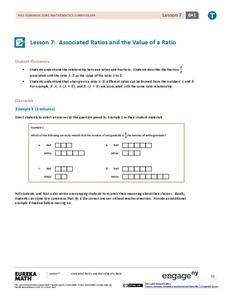EngageNY
Systems of Equations Leading to Pythagorean Triples
Find Pythagorean Triples like the ancient Babylonians. The resource presents the concept of Pythagorean Triples. It provides the system of equations the Babylonians used to calculate Pythagorean Triples more than 4,000 years ago. Pupils...
Mathematics Assessment Project
Sharing Costs Equitably: Traveling to School
Drive or take the school bus? Class members determine the amount each student would have to pay in a carpool situation. They then evaluate the cost in a set of provided examples. I think I'd rather take the school...
University of Washington
Connecting Youth to Quality Health Information
Many teenagers don't have adequate access to health and nutrition information beyond a quick Internet search. Guide them into health advocacy and proficiency with a lesson focused on MedlinePlus as a reliable source for health...
EngageNY
Margin of Error When Estimating a Population Proportion (part 1)
Use the power of mathematics to find the number of red chips in a bag — it's a little like magic! The activity asks learners to collect data to determine the percentage of red chips in a bag. They calculate the margin of error and...
University of Minnesota
Fraction Operations and Initial Decimal Ideas
Add another strategy to the toolboxes of young mathematicians with this elementary math lesson on using number lines to add and subtract fractions.
Math Solutions
Race to 20
And they're off! Working in pairs, young mathematicians roll dice to see who can fill in their double ten-frames first. When students finally fill in their arrays, they create addition number sentences that represent their rolls, helping...
Illustrative Mathematics
Many Ways to Do Addition
A great aspect of teaching math is that children have the freedom to solve problems using a variety of different strategies. The focus of this lesson is for young mathematicians to become aware of many ways of answering addition...
Illustrative Mathematics
What is a Trapezoid? (Part 1)
Challenge your class to construct a definition for trapezoids. Looking at four examples and four non-examples, students individually create definitions and use them to classify an unknown shape. Allow for small group and whole-class...
EngageNY
Close Read, Part 1: “Hugo, the Lord’s Nephew”
Fourth time is a charm. Learners complete multiple reads of Hugo, the Lord’s Nephew. On the fourth read, they make notes about each page on sticky notes. They then complete a think-pair-share activity with a partner to determine the...
EngageNY
End of Unit 2 Assessment Part 2: Presenting a Claim
There's no time like the present for a presentation. Scholars present their claims about water management using facts, details, and examples from their research throughout the unit. Afterward, they complete exit tickets to evaluate their...
EngageNY
Mid-Unit 3 Assessment, Part 2: Explaining How New Information Connects to the Topic
Let's talk it out. Using the resource, scholars work in triads to discuss how their research has deepened their understanding about sustainable fishing. Next, pupils engage in a whole-class discussion to consider their next steps toward...
Anti-Defamation League
The Road to Brown
As part of the study of segregation in U.S. schools, scholars research and create a timeline of events that led to the historic Supreme Court case, Brown V. Board of Education. Groups research a topic or event that led to the decision,...
Advocates for Human Rights
The Right to a Clean Environment: Right to a Clean Environment Role-Play
A lesson challenges scholars to think critically about the world in which they live. Learners begin by role-playing a character, answering questions, and taking part in a whole-class discussion. They then brainstorm ways they can help...
Curated OER
Problem Solving - Adding Whole Numbers
In order to practice problem-solving skills, pupils work through a series of word problems. They each determine an answer and then share their thinking process with the class. This instructional activity demonstrates that there may be...
Curated OER
Division by Fractions (Part Two)
Investigate division through the use of array models. The lesson focuses on using area models to compare division as sharing with division as grouping. Students evaluate the usefulness and limitations of the two array models.
Teacher.org
Christmas Around the World Part 1
A creative lesson shines a spotlight on Christmas celebrations throughout six different countries. Scholars read an informative text and share their new-found knowledge with their peers. After hearing about each country, pupils choose...
EngageNY
Associated Ratios and the Value of a Ratio
Do ratios have values? The seventh lesson in a series of 29 introduces the value of a ratio. Pupils create associated ratios to a given ratio. They also describe the fraction associated to the ratio as the value of the ratio.
Global Oneness Project
What Does it Mean to Be Resilient?
Imagine the determination it would take to build a helicopter out of scrap. Now imagine doing it while hindered by the effects of polio. Everything is Incredible, a short film by Tyler Bastian, introduces Agustin who has been...
Illustrative Mathematics
Money in the Piggy Bank
It's time to crack open that piggy bank and see what's inside. First, count up the pennies, nickels, dimes, and quarters, identifying what fraction of them are dimes. Then calculate the total value of the coins, writing another fraction...
Rational Number Project
Initial Fraction Ideas: Lesson 3
Visual models support young mathematicians as they deepen their fractional number sense in this elementary math lesson. Using fraction circle manipulatives, children explore basic unit fractions as they develop the fundamental...
Smithsonian Institution
Trait Tracker
Help mice beat the odds with an exciting activity about traits. Biologists discover the role of diet and other factors on animal traits by participating in a simulation activity. Teams collect and evaluate data to understand how certain...
Pace University
Urban Communities
Urban communities are the focus of a series of lessons created to meet specific needs using differentiated instruction. A pre-assessment designates scholars into three groups based on their ability level. Small groups take part in...
Curated OER
Real Life Math
Students have the opportunity to represent real-life situations mathematically in order to become familiar with part-to-whole relationships. In this real life math lesson, students study windowpanes and describe their shape and total...
Curated OER
Enough About I — Let’s Talk About Me
Young scholars review parts of speech and share informative usage presentations to their classmates. In this grammar lesson, students discuss the importance of using appropriate speech and then read "The I's Have It." Young scholars...




